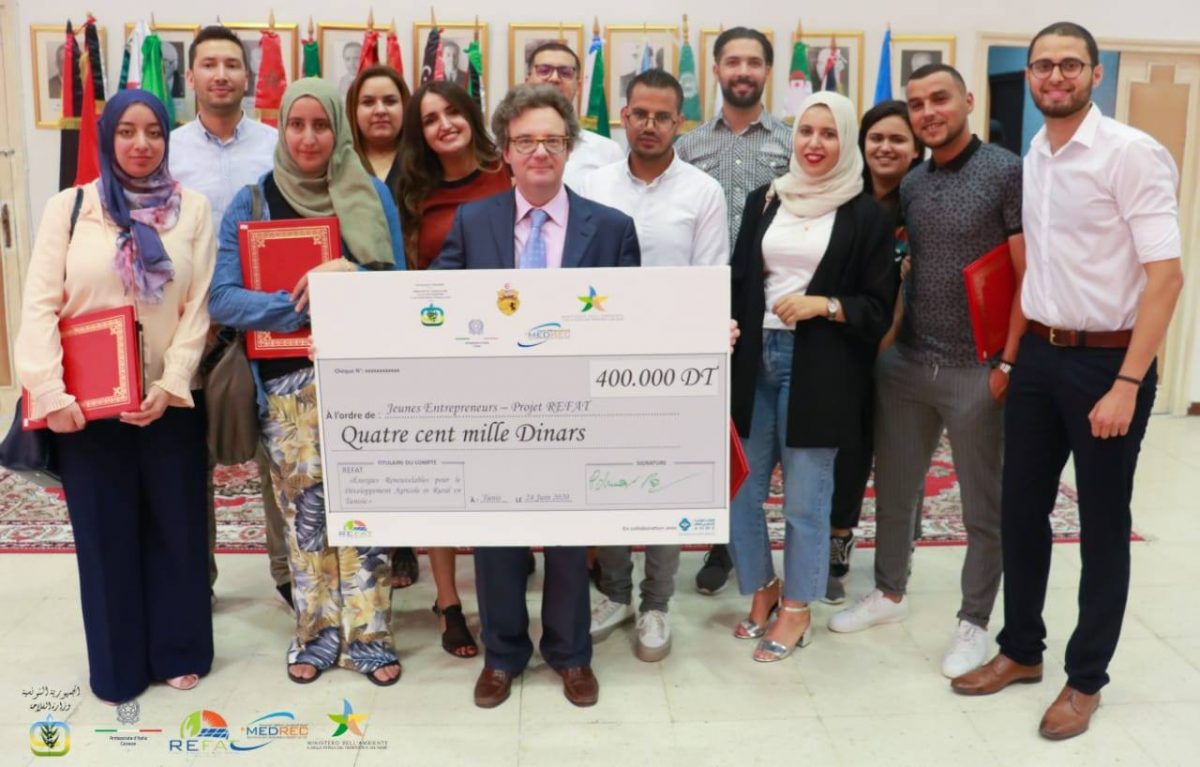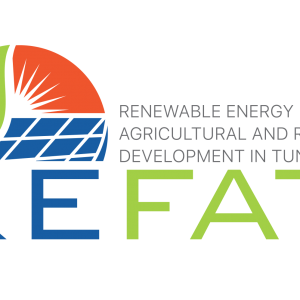REFAT “Renewable Energies for Agricultural and Rural Development in Tunisia”
REFAT is a cooperation project that is part of the international effort to fight against climate change by mitigating greenhouse gases to achieve the objective of staying below 2 degrees Celsius of increased temperatures, and adapting to the adverse effects of these changes.


Overview of the project

- Training program on renewable energy applications and eco-sustainable agricultural practices
In preparation for project planning, a meeting was organized by MARHP to identify training centers belonging to national institutions potentially suited to the project objectives. The main institutional actors concerned by the training missions attended the meeting and jointly identified two training centers to be considered for the implementation of the training program: Higher Institute of Technological Studies in Tozeur and Higher School of Rural Equipment Engineers in Medjez Elbeb. The training will focus mainly on the installation and maintenance of solar irrigation systems SPIS3 and water saving systems.
Training content: program and materials will be developed by an expert assisted by the staff of the concerned departments of MARHP. The content of the training program will refer to recent studies conducted by national (IRESA, etc.) and international institutions (FAO, Global Alliance for Climate Smart Agriculture, etc.) in the areas concerned.
Depending on the readiness of each center (a survey will be conducted on the site conditions) with regard to the training requirements, and depending on the accessibility and accommodation possibilities, both centers will be equipped to host three-month training sessions. The training program will be designed to be delivered by qualified, pre-trained trainees. A selection process will be conducted to enroll (1) 30 newly graduated technicians in fields relevant to the project, and (2) a number of key actors in the Tunisian agricultural sector, in the 150-hour training sessions over three months. The project also plans to involve Italian experts for a transfer of knowledge and know-how on renewable energy applications in agriculture, aiming at enriching the training and contributing to a common reflection on the main issues and challenges of the dissemination of solar energy irrigation systems among Tunisian farmers. The training sessions will be closed at the end of the first half of 2019 to follow the certification of trainees.
- Accompaniment and support for 10 trainees in the construction of start-ups for the integration of SPIP and other agricultural services
A group of 10 trainees recruited from among the best apprentices who are committed to building businesses specializing in outreach services to farmers in rural areas of the target regions. This group will benefit from a business development coaching and mentoring program to help each trainee develop their business plan and successfully develop their own start-up. Interns in this group will receive basic business equipment and a seed fund to obtain a loan. Each will be accompanied in the installation of one pilot solar-powered irrigation system which will constitute their first reference for future activity. An assessment report will be drawn up to point out the strengths and weaknesses of the inception phase of each start up.
- Establishment of pilot systems: To ensure the success of the project activities
The identification of pilot sites will take into account parameters such as: pump size, annual operating hours, commitment of the beneficiary farmers (GDA), nature of the crops (high value crops), etc. Ten SPIS will be installed by the young entrepreneurs supervised by a qualified installer to ensure correct sizing of the components. An integrated monitoring system with possible remote control will be set up to measure the performance of the system on the one hand, and to monitor the results obtained against the set objectives on the other hand.
In order to follow the expected results at the micro and macro scale (reduction of energy bill, improvement of access to water, etc.), dedicated monitoring tools will be set up to capture baseline figures and variations (possible indicators at the micro scale: new irrigation systems, reduced amount in the energy bill, etc.).
In some cases, a reservoir will be designed to store water during periods of insufficient solar irradiation A small-scale desalination unit, and a plant water treatment unit will also be planned and implemented to test the effectiveness of these systems in producing water suitable for irrigation needs.
The solar pumping systems will be placed close to the wells and will require special provisions: earthworks for the installation of the solar panels, a water tank for storage corresponding to the volume needed for irrigation in summer and a secure room to house the pump and the inverter. Pumping is usually done during the day, while irrigation is done at night to avoid water evaporation. The additional cost associated with these provisions is estimated at 20% to 30% of the total investment cost for the acquisition of the solar pumping system.
The project will take advantage of available opportunities for knowledge exchange and technology transfer, especially for solar powered irrigation systems (SPIS). The data collected from the different monitoring systems will be summarized in a report in order to capitalize on the strengths of the implemented pilot projects and to take into account the feedback from the beneficiary farmers.
- Studies and analysis: The energy and agriculture sectors are seen as key drivers for job creation in Tunisia
Tunisian policy generally follows a sectoral approach to the energy-water-food nexus; MARHP intends to take a step forward towards comprehensive planning that takes into account the linkages between energy, water and agricultural production, as well as finance, technology and policy.
In addition to the pilot program, MARHP will conduct a market potential analysis of renewable energy applications in the agricultural sector with a focus on water-related challenges to attract the attention of investors and funding programs.
A study of the current policy and existing financial mechanisms will also be conducted to make recommendations, and propose a more effective mechanism for the dissemination of renewable energy systems in the agricultural sector. This study will highlight the realization of a set of operational measures aimed at optimizing the processing time of the farmer’s subsidy application and simplifying the procedures, while avoiding the multiplicity of controls and vis-à-vis. The environmental aspect will also be addressed in this study to highlight the importance of assessing the availability of water resources and the impact of using renewable energy technology for irrigation on these water resources.
- Implementation of a 500 kWp solar photovoltaic plant
MARHP will capitalize on its experience in the renewable energy water sector acquired through a first solar power plant project of 211 kWp located in the water desalination unit of Ben Guerdane (Governorate of Medenine) carried out in 2013 as well as a tender launched in May 2018 for an extension of 400 kWp.
Recent Tunisian regulations (entered into force in 2015) allow and encourage public companies to carry out renewable energy projects connected to the national grid according to the system of self-production (consumption on the same site or energy transport to other connected networks).
The project “Renewable energy for agricultural and rural development in Tunisia” provides for the realization of a photovoltaic plant of 500 kWp in Gabes (Ben Ghilouf) near the existing pumping station, which will be connected to the national grid. The photovoltaic plant will be carried out in accordance with the technical requirements for connecting electricity generated from renewable energy to the grid (Order of the Minister of Energy, Mines and Renewable Energies, February 9, 2017). It is estimated that this photovoltaic plant will cover 20% of the energy demand of the desalination unit that should be installed soon on the same site.
The total budget has been defined based on the estimated cost of a 1kWp PV installation at 1200euros, and with the consideration of site preparation costs and rehabilitation measures ensuring the energy efficiency of the plant.
- Dissemination and communication
Dissemination and communication activities aim, on the one hand, to inform potential beneficiaries of the project’s objectives and the selection process at each stage and, on the other hand, to raise public awareness of the project’s results.
Communication activities are mainly focused on field awareness campaigns and site visits, as well as on the organization of technical workshops and events for the socio-economic world. To ensure the sustainability of the project activities, one way of communicating about the available incentive schemes is to have upstream companies and solar equipment suppliers inform and help farmers apply for the national support program for solar irrigation (APIA and ANME grants) and other renewable energy applications.
The project "Renewable Energies for Agricultural and Rural Development in Tunisia" (REFAT) is based on the following axes: 1/ Dissemination of solar-powered irrigation systems and installation of low-energy water treatment demonstrators in small-scale agriculture (solar desalination of slightly brackish water and phyto-purification in rural areas); 2/ Integration of solar photovoltaic energy to mitigate the high energy consumption of drinking water production systems; 3/ Capacity building for key actors involved in the promotion of renewable energy in the framework of the water-energy-food nexus.
Ongoing research
10/01/2018 - 12/31/2021 - project still in progress
- 1 photovoltaic plant of 500 kW for the pumping of drinking water in rural areas
- 2 pilots of desalination stations of slightly salted water for small irrigation and one pilot of phytodepuration stations
- 10 pilots of solar photovoltaic pumping stations for small-scale irrigation
- 26 young graduates who will receive training on renewable energy, sustainable practices and entrepreneurship, serving the Tunisian farmer
- 10 agents of the General Commissariat for Regional Development (CRDA) to receive training on renewable energy and sustainable agricultural practices for the Tunisian small farmer
- 10 start-ups in the fields of renewable energies and sustainable practices at the service of the small Tunisian farmer
- 2 studies: (1) potential markets for sustainable technologies for agriculture, (2) proposed mechanisms to promote renewable energy in the agricultural sector
1 B2B workshop on sustainable techniques and technologies for small-scale agriculture
In terms of energy:
- Achieve energy savings of 44 Ktoe through the integration of renewable energy in small-scale irrigation
- Achieve energy savings of 133 ktoe by integrating renewable energy for 30% of the water sector’s electricity needs for the period 2018-2030
From an environmental point of view:
- Avoiding GHG emissions of 136 KtCO2 from small-scale irrigation and about 856 KtCO2 from the water sector;
From a social point of view:
- Develop a local economy and create 48 direct jobs per year.
Total budget: 2 195 800 €.
Contribution of the Ministry of Agriculture (Tunisia): 222 800€.
Contribution of the Ministry of Environment (Italy): 1 973 000€.
organisation
The Mediterranean Renewable Energy Center – MEDREC – is a think tank and an operational platform for regional cooperation. Its main mission is to support and stimulate collaboration for sustainable development and energy transition in the Mediterranean region, mainly through the design and implementation of projects with the support of different funding agencies.
MEDREC is a non-profit economic interest grouping based in Tunis, jointly created by the Italian Ministry of Environment and the Tunisian Ministry of Energy with the participation of different agencies in charge of energy management in the Mediterranean region.
The work of MEDREC covers different topics, mainly:
- Sustainable development; Climate change adaptation and mitigation
- Technological innovation for sustainable development
- Green jobs for sustainable growth
- Renewable energy and energy efficiency
- Sustainable management of natural resources
- Eco-innovation and circular economy
MEDREC has effectively assisted Mediterranean public and private actors and NGOs with expertise in:
- Project design
- Project management and implementation
- Capacity building and dissemination
- Research valorization
- Various consulting services
in collaboration
http://www.esier.agrinet.tn/
http://www.isett.rnu.tn/
http://www.citet.nat.tn/




